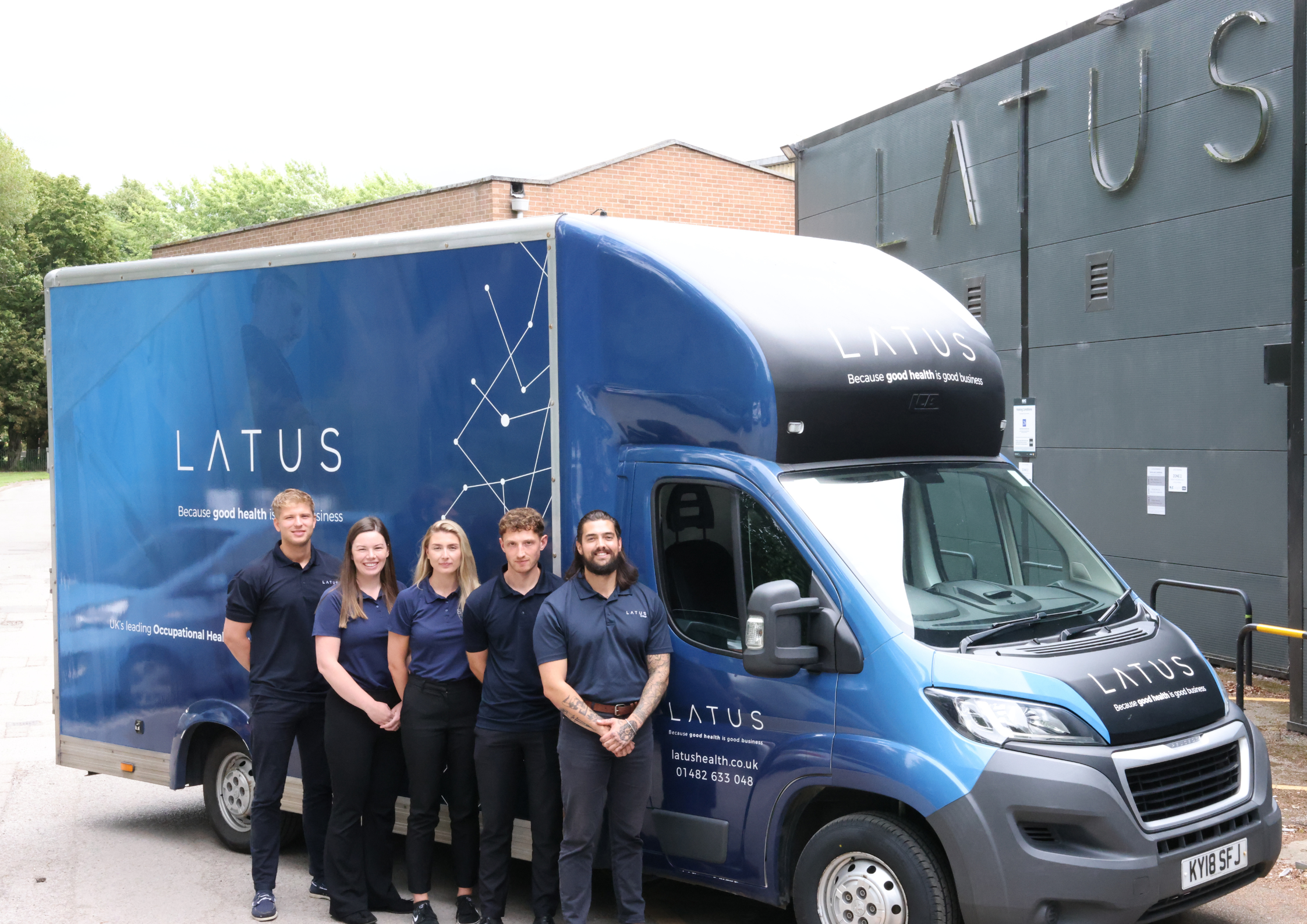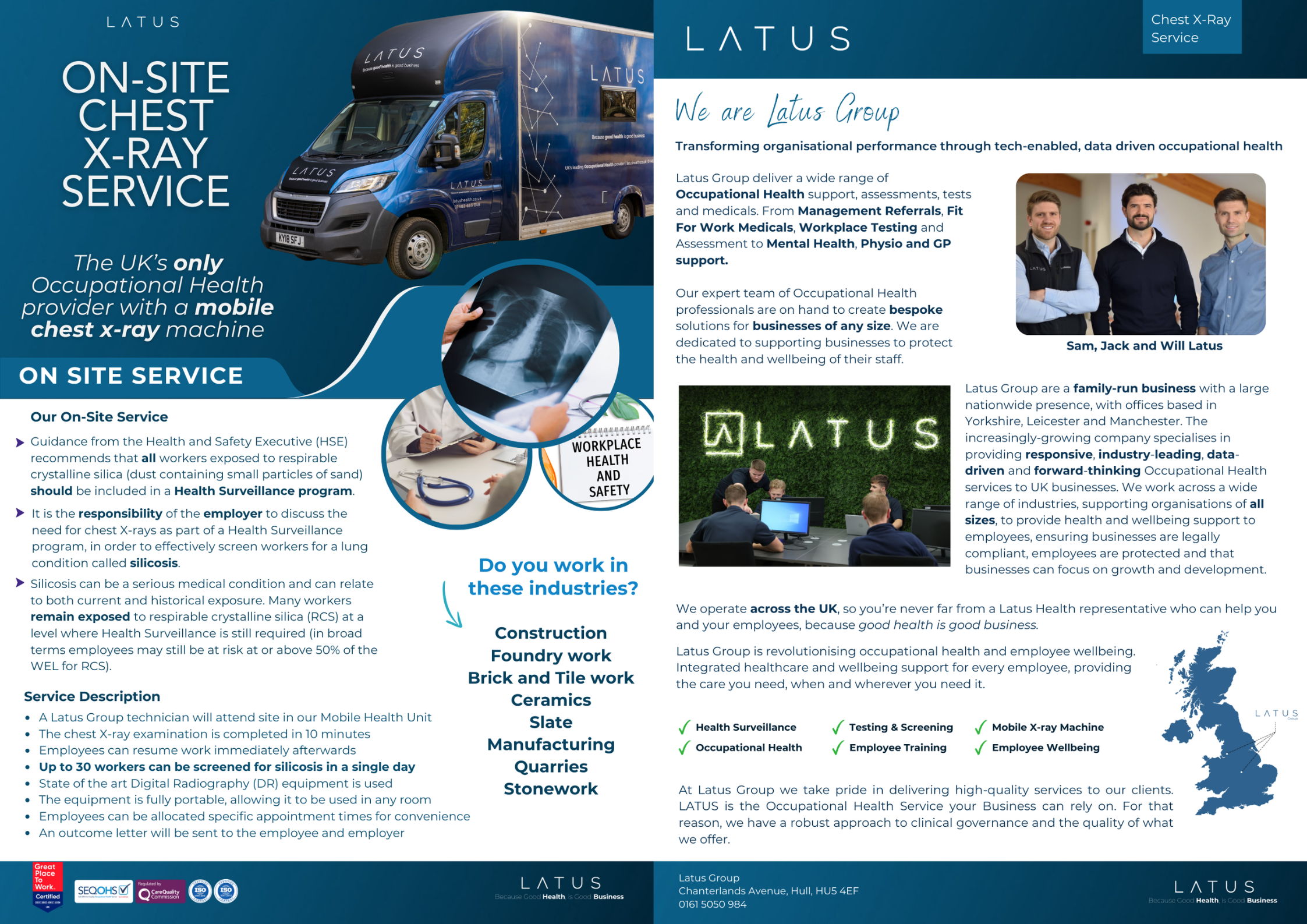UK's first death from artificial stone silicosis confirmed. Medics warn of rising numbers of silicosis in the UK
Have you screened your workers?
Book your Mobile Chest X-ray appointment now!
Medics have warned of rising numbers of silicosis in the UK
Medics have warned of rising numbers of silicosis in the UK, amongst British workers working with artificial marble and granite.
Recent studies have revealed a concerning trend in the development of silicosis among workers in the stone fabrication industry.
And now medics have called for a ban on the popular material used to make kitchen worktops.
The rising numbers of silicosis, including the first UK case of silicosis, is linked to the cutting of artificial stone was identified in 2023 and medics have seen a rise in cases since.
Worryingly, medics have now reported the UK’s first death and a further 11 cases of artificial stone silicosis, with patients’ average age being just 34 years old.
Some had worked cutting artificial stone for just four years before they were diagnosed with silicosis.
Now a law firm, Leigh Day solicitors, have stated they are taking on lawsuits from men as young as their 20s who have developed the illness, with the new study reporting the first eight cases of silicosis in men aged between 27 and 56.
We may be on the threshold of a significant rise in cases
Silicosis is a serious lung disease caused by inhaling silica dust, which is a byproduct of cutting and processing artificial stone materials commonly used in kitchen and bathroom worktops.
High-silica artificial stone, is popular in kitchen and bathroom renovation because it can be made to look like marble or granite but is much cheaper.
Rising numbers of silicosis in the UK
While the UK has established exposure limits for silica dust, enforcement challenges and widespread non-compliance remain significant issues. High-silica artificial stone, also known as engineered stone or quartz, is already banned in Australia.
Study author Dr Johanna Feary, lung disease expert at the Royal Brompton NHS trust in London, said: “The emergence of these cases is of real concern.”
“It is affecting young men, many of whom have only worked with this material for a few years. There is no good treatment and a diagnosis can be devastating. The UK needs to learn from the experience in other countries and to act quickly to minimise the number of deaths in the months and years to come.”
Dr Feary, who also works as a senior clinical research fellow at Imperial College London, told PA news agency: “We’ve known about the problems associated with artificial stone silicosis from colleagues from around the world for the last few years, but we had not seen any confirmed cases in the UK until the middle of last year when they started arriving in my clinic.”
The disease appears to get worse even after men stopped breathing the dust.
Doctors have raised concerns by how the disease appears to get worse, even after workers stopped breathing the dust.
The rising numbers of silicosis in the UK have been likened to be similar to the incurable diseases asbestosis and mesothelioma that developed in thousands of labourers who worked with asbestos in the 1900s.
Workers in certain occupations are at higher risk of silica exposure, such as construction workers, stonemasons, tile layers and glass workers. Workers in these sectors should ensure their employers are providing the necessary protective equipment as well as conducting routine chest X-ray’s.
“UK cases are likely to increase, with urgent action needed to identify cases and enforce regulations.”
If your work involves cutting, drilling, or crushing silica-containing materials, it’s crucial to take steps to minimise dust exposure.
Latus Group offers a mobile chest x-ray service, screening workers on-site and giving employers and employees the reassurance they need.
Guidance from the Health and Safety Executive (HSE) recommends that all workers exposed to respirable crystalline silica (dust containing small particles of sand) should be included in a Health Surveillance program.
It is the responsibility of the employer to involve a health professional and to discuss the need for chest X-rays as part of a Health Surveillance program in order to effectively screen workers for a lung condition called silicosis.
What is Silicosis?
The condition occurs when silica dust is inhaled, causing inflammation in the lungs. Medics have warned there are rising numbers of silicosis in the UK with a spike of cases predicted.
This gradually leads to hardened and scarred lung tissue which means the lung cannot function properly.
This can lead to a persistent shortness of breath, weakness and tiredness and an ongoing cough.
People with the condition may eventually find simple activities – such as walking or climbing stairs – very difficult and may be largely confined to their bed or be housebound.
Silica is a naturally occurring mineral found in sand, stone, and rock. It’s also present in some manufactured materials like concrete and artificial stone. When these materials are cut, drilled, or crushed, they release silica dust particles into the air.
It has no known cure – though some with the condition have received lung transplants – prompting researchers to say that prevention of the disease in the first place is “critical”.
Do my workers need it?
The Health and Safety Executive (HSE) have enforced limitations for what an individual’s personal exposure to RCS can be within a working day.
The HSE states, “Health Surveillance should be considered for workers who are involved in high-risk occupations, including construction, foundry work, brick and tile work, ceramics, slate, maufacturing, quarries and stonework. Where workers are regularly exposed to RCS dust and there is a reasonable likelihood that silicosis may develop, Health Surveillance must be provided”
The current Workplace Exposure Limit (WEL) is 0.1mg per cubic metre over a Time Weighted Allowance (TWA) of 8 hours, and a Maximum Exposure Limit (MEL) of 0.3mg per cubic metre.
The Control of Substances Hazardous to Health (COSHH) Regulations provides guidance for employers on how to assess and control exposure to hazardous substances, including silica dust.
Latus Group’s Mobile Chest X-ray: a convenient and effective screening tool
Latus Group provide a mobile, on-site chest X-ray service that fully aligns employers with this recent updated guidance from the HSE, enabling them to demonstrate good working practice.
By implementing regular mobile chest X-ray screenings, companies can proactively protect their workforce from the devastating effects of crystalline silica dust. Early detection allows for treatment interventions and ensures workers are aware of the risks associated with their jobs.
Latus Group’s mobile solution empowers businesses to prioritise worker health and safety, creating a healthier work environment for all.
What to expect from your chest x-ray with Latus Group
Latus will attend site on a day convenient to the site and deliver a chest X-ray service against shift patterns of employees.
The entire chest X-ray examination is completed within 10 minutes and employees are able to return to their normal activities immediately.
Up to 30 workers can be screened for silicosis in a single day.
State of the art Digital Radiography (DR) equipment is used; this gives a very high resolution image which is a very effective screen for silicosis or other occupational lung disease.
Furthermore, the equipment used delivers very low doses of radiation and the risk is therefore extremely low.
The equipment is fully portable, allowing the chest X-rays to be taken in a suitable room on-site. We will ensure the room is suitable through a risk assessment process.
Employees can be allocated specific appointment times for their chest X-ray against a schedule that we will provide.
Once the chest X-rays have been taken, read and reported on, an outcome letter will be sent to the employee and employer. The letter will advise on the results of the chest X-ray and the appropriate action regarding continued participation in statutory Health Surveillance, including the chest X-ray program.
To submit an enquiry to book our mobile chest x-ray service, click here



